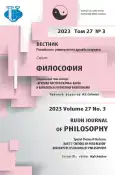Birth of ‘Criticism of Historical Reason’: W. Dilthey and I. Kant
- 作者: Anufrieva K.V.1
-
隶属关系:
- Tver State University
- 期: 卷 27, 编号 3 (2023): KANT’S “CRITIQUE OF PURE REASON” AND WAYS OF ITS READING BY PHILOSOPHERS
- 页面: 527-540
- 栏目: KANT’S “CRITIQUE OF PURE REASON” AND WAYS OF ITS READING BY PHILOSOPHERS
- URL: https://journal-vniispk.ru/2313-2302/article/view/325234
- DOI: https://doi.org/10.22363/2313-2302-2023-27-3-527-540
- EDN: https://elibrary.ru/CBORGE
- ID: 325234
如何引用文章
全文:
详细
W. Dilthey’s program of “criticism of historical reason” was formed in a polemic with the legacy of I. Kant on the basis of transcendental reflection of the data of descriptive psychology. It was focused on understanding the radical difference between the sciences of the spirit and the sciences of nature. Starting from a critical rethinking of Kant's legacy within the boundaries of his own version of the academic philosophy of life, Dilthey began to talk about the fact that the reason, directing the cognitive activity of the subject, is characterized, first of all, not by the theoretical “purity”, but by its involvement in the “open” flow of history, which it gives meaning and sense through language. It interacts with historical experience, which arises through the synthesis of actual events perception in the time flow and memory images with real categories and concepts constructed by the intellect of the human subject. The ability to judge what is happening in history, its assessment in a humanistic perspective, is also considered by Dilthey as inseparable from the work of historical reason. The reason involved in the flow of time and life cannot be a carrier of theoretical “purity” and acts as inherently hermeneutic in its nature. Dilthey presented an interesting analysis of the main levels of hermeneutical procedure - emotional perception, expression and understanding, aimed at comprehension of the diversity of spiritual and cultural worlds in synchrony and diachrony of their existence. Denying the possibility of comprehending the meaning and sense of history by constructing substantialist schemes, he asserted the importance of narrative representation of the past in the light of the present. Dilthey's project of “criticism of historical reason” was based on the idea of the “openness” of the meaning of the past, due to its rootedness in the very way of human existence in time. This idea was inherited and further developed in the horizon of the fundamental ontology of M. Heidegger and other contemporary thinkers of hermeneutical orientation.
作者简介
Karina Anufrieva
Tver State University
编辑信件的主要联系方式.
Email: carina-oops@mail.ru
ORCID iD: 0000-0002-9539-3630
Candidate of Sc. in Philosophy, Associate Professor, Department of Philosophy and Theory of Culture
33 Zhelyabova St., 170100, Tver, Russian Federation参考
- Soboleva ME. Philosophical Hermeneutics: Concepts and Approaches. Moscow: Gaudeamus publ.; 2014. (In Russian).
- Hodges HA. Philosophy of Wilhelm Dilthey. London: Routledge; 2013.
- Nelson ES. Introduction: Dilthey in Context. In: Interpreting Dilthey: Critical Essays. Cambridge: Cambridge University Press; 2019. P. 1—18.
- Dilthey W. Introduction to the Sciences of the Spirit. In: Collected Works in 6 Vol. Vol. 1. Moscow: Intellectual Books House publ.; 2000. P. 271—727. (In Russian).
- Dilthey W. The Constitution of Historical World in the Sciences of the Spirit. In: Collected Works in 6 Vol. Vol. 3. Moscow: Intellectual Books House publ.; 2000. P. 43—405. (In Russian).
- Plotnikov NS. Life and History: Wilhelm Dilthey’s Philosophical Program. In: Dilthey W. Collected Works in 6 Vol. Vol. 1. Moscow: Intellectual Books House publ.; 2000. P. 15—264. (In Russian).
- Кant I. The Critique of Pure Reason. In: Collected Works in 6 Vol. Vol. 3. Moscow: Mysl’ publ.; 1964. P. 69—774. (In Russian).
- Gubman BL. The Meaning of History. Essays on Contemporary Western Theories. Moscow: Nauka publ.; 1991. (In Russian).
- Groethuysen B. German Editor’s Preface. In: Dilthey W. Collected Works in 6 Volumes. Vol. 3. Moscow: Intellectual Books House publ.; 2004. P. 35—40. (In Russian).
- Dilthey W. The Rise of Hermeneutics. In: Dilthey W. Collected Works in 6 Vol. Vol. 4. Moscow: Intellectual Books House publ.; 2000. P. 235—262. (In Russian).
- Husserl E. Philosophy as an Exact Science. In: Selected Works. Moscow: Publishing House ‘Territory of the Future’; 2005. С. 185—240. (In Russian).
- Кant I. The Critique of Judgement. In: Collected Works in 6 Vol. Vol. 5. Moscow: Mysl’ publ.; 1965. P. 311—327. (In Russian).
- Kurennoy VA. Editor’s Introduction. In: Dilthey W. Collected Works in 6 Vol. Vol. 3. Moscow: Intellectual Books House publ.; 2004. P. 11—14. (In Russian).
- Belov VN. Introduction to Philosophy of Culture. Moscow: Academic Project publ.; 2008. (In Russian).
- Heidegger M. The Notion of Time. Saint Petersburg: Vladimir Dal’ publ.; 2021. (In Russian).
补充文件









